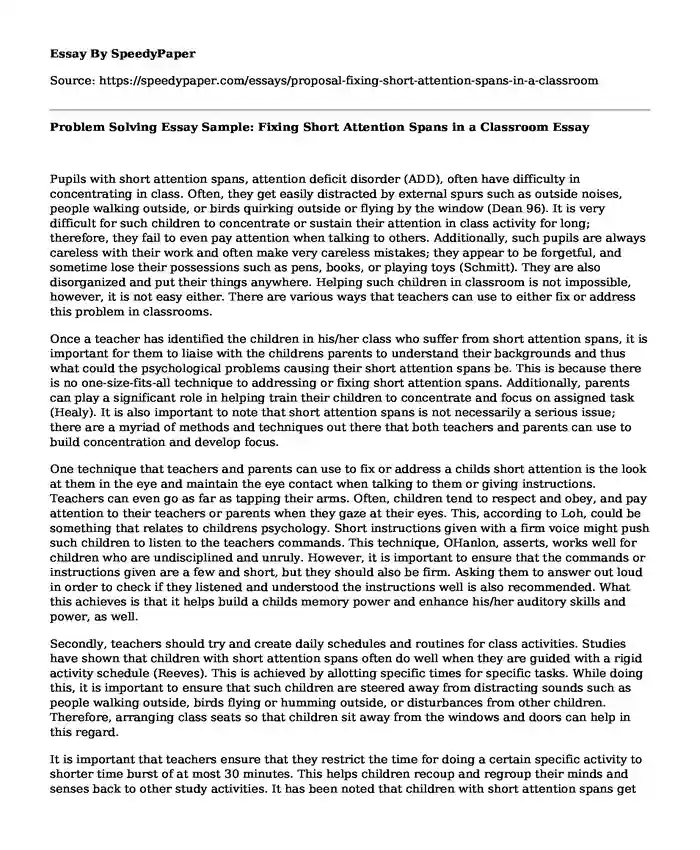Pupils with short attention spans, attention deficit disorder (ADD), often have difficulty in concentrating in class. Often, they get easily distracted by external spurs such as outside noises, people walking outside, or birds quirking outside or flying by the window (Dean 96). It is very difficult for such children to concentrate or sustain their attention in class activity for long; therefore, they fail to even pay attention when talking to others. Additionally, such pupils are always careless with their work and often make very careless mistakes; they appear to be forgetful, and sometime lose their possessions such as pens, books, or playing toys (Schmitt). They are also disorganized and put their things anywhere. Helping such children in classroom is not impossible, however, it is not easy either. There are various ways that teachers can use to either fix or address this problem in classrooms.
Once a teacher has identified the children in his/her class who suffer from short attention spans, it is important for them to liaise with the childrens parents to understand their backgrounds and thus what could the psychological problems causing their short attention spans be. This is because there is no one-size-fits-all technique to addressing or fixing short attention spans. Additionally, parents can play a significant role in helping train their children to concentrate and focus on assigned task (Healy). It is also important to note that short attention spans is not necessarily a serious issue; there are a myriad of methods and techniques out there that both teachers and parents can use to build concentration and develop focus.
One technique that teachers and parents can use to fix or address a childs short attention is the look at them in the eye and maintain the eye contact when talking to them or giving instructions. Teachers can even go as far as tapping their arms. Often, children tend to respect and obey, and pay attention to their teachers or parents when they gaze at their eyes. This, according to Loh, could be something that relates to childrens psychology. Short instructions given with a firm voice might push such children to listen to the teachers commands. This technique, OHanlon, asserts, works well for children who are undisciplined and unruly. However, it is important to ensure that the commands or instructions given are a few and short, but they should also be firm. Asking them to answer out loud in order to check if they listened and understood the instructions well is also recommended. What this achieves is that it helps build a childs memory power and enhance his/her auditory skills and power, as well.
Secondly, teachers should try and create daily schedules and routines for class activities. Studies have shown that children with short attention spans often do well when they are guided with a rigid activity schedule (Reeves). This is achieved by allotting specific times for specific tasks. While doing this, it is important to ensure that such children are steered away from distracting sounds such as people walking outside, birds flying or humming outside, or disturbances from other children. Therefore, arranging class seats so that children sit away from the windows and doors can help in this regard.
It is important that teachers ensure that they restrict the time for doing a certain specific activity to shorter time burst of at most 30 minutes. This helps children recoup and regroup their minds and senses back to other study activities. It has been noted that children with short attention spans get bored very quickly and easily. Avoiding this requires keeping studying time short, while shifting from one subject to another; mixing it up a little bit ensuring that there are time gaps in-between each session (Loh). Additionally, altering teaching methods from time can help keep the children from losing their concentration. Further, it is important to offer them breaks to move around and play around; however, teacher must be careful with this technique especially if dealing with prayerful children. This is because it may pose a challenge especially when trying to get them back to study work.
Finally, teachers can also try to award positive behavior in class this implies rewarding and reinforcing positive behavior. For example, a teacher can commend a child who is often distracted when the child shows ability to concentrate for longer periods than usual. That kind of positive reinforcement can go a long way in developing a childs long attention pan. Further, a teacher can choose to arrange children with long attention spans, especially those in higher grades, to sit bet children with short attention spans and ask them to remind them to pay attention whenever they drift away or even help them with their classwork...
Cite this page
Problem Solving Essay Sample: Fixing Short Attention Spans in a Classroom. (2020, Oct 12). Retrieved from https://speedypaper.net/essays/proposal-fixing-short-attention-spans-in-a-classroom
Request Removal
If you are the original author of this essay and no longer wish to have it published on the SpeedyPaper website, please click below to request its removal:
- Educational Psychology Essay Sample: Curriculum Adjustments for Children with Low Functioning Autism
- Professional Curriculum Vitae, Free Paper Example
- Free Essay Describing the Product Concept in Marketing
- Free Essay Example on Alternative Medicine
- Free Essay about the Research Conducted on the Importance of Taking Time to Celebrate
- Essay Sample on Happy Endings and Birdsong
- Paper Example. Artificial Intelligence in Prosthetic Limbs
Popular categories





